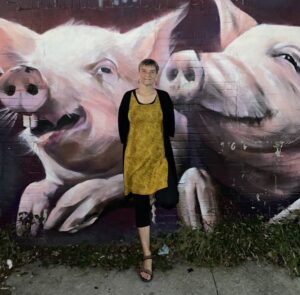Content warning: this story depicts domestic violence and has discussions of sexualized violence.
The Johnny Cash records. Well, we left behind all the records, along with that battered record player in the teal case. All of us, when we were little, liked to play with the metal clasp on that case, snap it open and shut, open and shut. There was a fierceness to the way the bright silver fastener bit down into place, locking the box closed, hiding what was inside. Yes, we left all the records behind in that run-down bungalow in Scarborough, but it was the I Walk the Line album that stayed with us, it was the one we remembered. That half-smile, half-sneer on Johnny’s face, the glint of his bright teeth, the way the side of his head was in shadows, but his ear was lit up, larger than life, like it could hear our every whisper.
Thirty years later, Alice still danced the same way she used to when she was a kid, listening to Johnny croon, her feet planted in one spot on the floor, her body swaying slightly, her eyes closed, her head thrown back, her wavy straw-coloured hair tumbling down her thin shoulder blades. Somehow, even though she hardly moved at all, everyone watched her dance. It had always been like that; she didn’t want to be at the centre of things, but she was so ethereal, she pulled everyone towards her. And the little ones, the twins—Penny and Kitty—they lived their lives by that line in the song: I keep a close watch on this heart of mine, I keep my eyes wide open all the time.
◊ ◊ ◊
The lilac tree. It was old and large, growing in the backyard at the corner where the fence met the garage. We all climbed the tree a little differently. Bea, the eldest of us, climbed up to the garage roof first, matter-of-factly; Robin climbed it impatiently, like it was an obstacle in her way. She was one year younger than Bea, always chasing after her, competing with her. Alice lingered in the tree, ran her hands over the shaggy peeling bark, paused to wait while a thin line of ants crossed the trunk. And me? I climbed that tree like it was a jungle gym, jumping up to swing from the thickest branch with my legs dangling, which made the whole tree sway, before scrambling up. The twins—the littles, we called them—were both cautious. Penny was so deliberate, so careful about where she put her feet: left foot on the third wire of the fence, right foot on the wooden beam of it, a little swivel around, then left to the crook of the tree, right on to the garage roof. Kitty was always last, always scared to leave the ground. Once we were up top, we’d find our place: Bea sat cross-legged in the small patch of shade from the lilac tree, with Penny tucked behind her like a shadow; Alice lay out flat like a starfish, face to the sun; Robin sat with her legs hanging over the edge; Kitty scurried on her hands and knees towards the peak of the roof, where I liked to stand, looking up, hopeful for a glimpse of the moon in the daylight, pale against the blue sky. We went there to get away from the house, to get away from him.
Usually, it was just bruises and blood—he was vicious when he drank—but one time he went too far, and he broke Kitty’s arm. Bea drove her to the hospital, even though she didn’t have her learner’s permit yet. She told the doctor Kitty had fallen while climbing the lilac tree in our backyard. Kitty had fallen earlier that year, her hand slipping as she reached for the thin branch above her head, her body tumbling back onto the wet grass, the breath knocked out of her. All of us were up on the roof already. For one breathless moment we were frozen, looking down at Kitty, flat on her back, her orange terry cloth t-shirt pulled up, leaving a bare strip of her tummy, her little outie belly button, exposed.
Years later at a party in a funky loft in the East End—all of us there except Robin, who was in rehab again—Kitty would tell the story about the summer that she broke her arm, how she’d lost her footing climbing the lilac tree. We all glanced away, looked at our sneakers, looked out that wide floor-to-ceiling loft window at the dark night and the bright streetlights, all of us unable to tell her what had really happened. After she told the story, she fell quiet, her eyes downcast; maybe she could sense the pull of a dark undercurrent—her forgotten truth.
The spring afternoons we spent up there on the roof were the ones we remembered best. Oh, the extravagance of those purple lilac blooms, the heaviness of the flower clusters hanging down in their exuberant bunches, the headiness of their perfume. We would sit for hours inhaling mauve. Bea would read her book, or sometimes read aloud to us; Alice would break off small branches laden with flowers and tie them with shoelaces into crowns, one for each of the littles and then one for herself; Robin would thumb wrestle each of us and win; the littles would play clapping games. I usually spent my time sorting through my marbles, choosing my favourites—the blue moon clearie, the galaxy, the devil’s eye—and then letting the littles play with the rest.
We all loved the lilacs, but it was Alice who cherished them the most. When we visited her in the hospital after she had her first breakdown, the year she gave up on getting her degree in botany, Robin brought her armfuls of pink and lavender carnations, giant bouquets of them spilling out of her embrace. It hurt our eyes to look at Alice, the way her long blonde hair lay flat and greasy around her pale face, like the dirty straw at the bottom of a hamster cage, but it hurt just as much to look at the cheerful blossoms. “They’re too excitable,” Kitty murmured, quoting a line from Sylvia Plath. That sister of ours was already an aspiring poet at seventeen.
◊ ◊ ◊
Our music box. It was small and white, the outside covered with gold-petalled flowers, the inside lined with a shiny turquoise satin. When we wound it up and opened the box, a tiny dancing ballerina mounted on a spring twirled around as “Fly Me to the Moon” played, the high, quick notes tinkling brightly. It never lasted: the dancer would start to spin a little erratically as the music slowed—plink, pliink, pliiink—to a stop, and Penny would inevitably burst into tears. Robin would laugh, but Bea would shush her and wind it back up again. There was a triangular mirror mounted on the inside of the lid, so you could watch the ballerina’s reflection dance as well, and Alice would peer into that mirror, as if she could somehow find her way into that perfect world that existed outside of our own.
As the years passed, the outside of the music box became stained and dirty; the ballerina on the inside tipped to one side, her crinkly tutu torn, her head snapped off. Robin was the one who broke her, but she swore it was an accident. Penny was hysterical, so Bea had tried her best to glue that little plastic head back on, but it kept falling off. We didn’t even like to open the music box anymore after that, didn’t want to see the brokenness hidden inside.
One summer we buried the music box in the backyard, part of a pirate game we’d been playing together. Bea had been reading Swallows and Amazons to us that year. Didn’t we all love that book—those feisty girls, the adventures they had! We spent summer mornings on the garage roof, raising our faces to the sun and the lake wind, setting sail in our small dinghies—Alice and Robin in the Amazon, me and Bea and the littles in the Swallow—calling out “Land ahoy” when we spotted Wild Cat Island off in the distance, across the long row of roofs stretched down the laneway. We’d drop anchor and drink from an old pop bottle filled with lemon-lime KoolAid—we pretended it was ginger beer—and eat saltines; we’d break branches off from the lilac tree and use them for fishing rods; Robin would walk the plank, teetering at the edge of the garage roof, while the littles squealed in half-terror, half-delight.
The day that we decided to bury our treasure trunk on Cormorant Island, we all agreed to use the music box. Bea reluctantly added the locket that our father had given her for her tenth birthday, a silver heart on a thin chain, a tiny black-and-white picture of our mother tucked into the left side of the heart, because we were all adamant that the treasure had to be something special. How we all coveted that locket. We all thought we’d get one of our own for our tenth birthdays, but when Robin turned ten, she got a hamster, and for Alice, well, he forgot her birthday, and gave her a twenty-dollar bill at the end of the day, instead of a gift. For my tenth, I got a shimmery white dress with red polka dots; I hated it, but it didn’t matter because it was too small anyway. And by the time the littles turned ten we were already gone.
When Kitty was twenty-three, she published her first book of poems. Shrouded within them was a glimpse of those summer days—a burst of bright laughter, the tang of sweetness on the tongue, the dappled shade of the lilac, the lake wind—but most of the poems spilled over with the things that lurked under that water, the dark terrors that threatened to drown us. We skimmed over the surface of that choppy lake that summer, reckless and brave, unafraid of drowning, but years later Kitty’s poems capsized us, left us with our heads just above the water’s surface, struggling to stay alive.
After her second go at rehab, when Robin was doing her twelve steps and making amends, she told us that she’d dug the music box back up and kept the locket. She could have chosen other, more recent things to apologize for—forgetting to take care of Penny’s cats that long weekend in September, borrowing money from Bea to pay for rent and then using it to fly to Key West—but instead she dangled that locket in front of us. We fought about it, viciously, like we used to when we were younger. Robin and I screamed at each other, and two bright red spots of colour appeared on her high cheekbones. Alice cried. Penny was frozen, wide-eyed and silent. Afterwards, Bea worked us like she was a border collie, trying to herd us back together. And months later, after refusing our calls and our invitations out, Kitty emerged from what she called her “bleak times” and offered us a new poem so sublime it broke our hearts wide open. And of course, we forgave Robin, because we all knew she was the bravest of us all. She was the one who fought our battles; we all knew she would slay a dragon for any one of us. And wasn’t she slaying her own dragon, just to watch it resurrect, over and over again? She was our rage, all of it condensed into her radiance, a burning red star blazing across our darkness.
◊ ◊ ◊
The cats. We left behind two, one living, one dead. The living one was a half-feral calico that roamed around our neighbourhood. She kept us up at night with her caterwauling, she brought fleas home to us. Mostly she was disdainful of our affections, except for Penny’s. Oh, they loved each other, those two. Harry—that’s what we’d named the kitten, after Harry the Dirty Dog, because she’d been a grubby little thing when we’d found her—would follow Penny anywhere, weaving around her ankles in a tight figure-eight, arching her thin back up when Penny’s small hand ran down her back, the vertebrae like a little row of pebbles that Penny might have arranged in the sandbox, one after another, in a careful, perfect line. She’d jump on Penny’s lap, curl up into a tight ball—like a scoop of Tiger Tail ice cream—and her pupils would shrink down into slits, her green eyes would blink closed, and she’d start to purr. Penny would sit for hours with Harry on her lap; once she even peed her pants because she didn’t want to move, didn’t want the comfort of that warm, heavy love to end. The day that we left, the cat was nowhere to be found, but maybe Bea never planned on bringing her anyway. Penny was hysterical, but Bea insisted we had to go without her. She told Penny that we’d come back for her, but we never did, and Penny never fully forgave Bea for that.
The other cat, Dearly, was buried in the backyard. He was a lazy grey cat, equally affectionate with all of us. Sometimes the littles would dress him up in our dolls’ clothes—a bonnet over his sharp, fluffy ears, his front legs shoved into a blue and white gingham dress—and carry him around, cradled like a baby. The cat didn’t seem to mind, but it enraged our father, seeing that tomcat dressed as a girl; once, in a blind fury, he chased the cat through the house, kicked him down the basement stairs. Penny hid, we all did, except for Robin who ran after him, pummelling his back with her small fists, screaming for him to stop. Dearly limped after that—a tenderness to his left front leg that made his shoulder blade dip downwards each time he took a step forward—but he survived. We all did.
Dearly lived another year before being hit by a car; we buried him in a shallow grave near the lilac tree. Alice scattered a handful of dandelions overtop of him, bright yellow blooms that wilted in the dirt. Kitty read a poem that she’d written, one of her first ones: Dearly was fine, he was love. He was good and grey, he was gone. Bea and Robin and I sang a song, one that we’d learned in Girl Guides, maybe—I remember us singing “My Paddle,” remember the flash of silver, the wild goose, the softness of the dip, dip, and swing—but Bea insists it was “I’d Like to Teach the World to Sing,” which we all knew from the Coca Cola commercial on TV that year. Penny painted a rock to place over Dearly’s grave. By the time we left the paint was long gone, and the rock had returned to being something unremarkable—a flat, dull grey stone with jagged edges—but at the last minute, Penny raced into the backyard to retrieve it, that day that we ran.
So, we left them behind, Dearly and Harry, but Penny carries them both in her heart still, all these years later, can bring herself to tears remembering how we didn’t protect Dearly, how we abandoned Harry. She loves the world slantwise now, her heart half-way closed, but wide open when it comes to animals. She is a dog-whisperer, a rescuer of the unwanted, the abandoned, the doomed. We can’t quite imagine it, the way she can tame her fear with the ones that snarl and lunge and bite, the way she can love them back to themselves, back to the good dogs they once were.
◊ ◊ ◊
Our house. Robin left first, left our home, left him, left all of us. We didn’t understand—at least I didn’t, so I can’t imagine the littles did—until we were older that Robin was having an affair when she was fifteen with her high school English teacher, Ms. Fenwick. She taught Bea in grade ten, then a year later, Robin. Bea remembered only one story that they studied—“The Lottery” by Shirley Jackson—and how much she hated that story got mixed up with how she felt about Ms. Fenwick. But for Robin, it went the other way; she fell in love the same way she did everything else—with a fierce recklessness. Ms. Fenwick came to pick Robin up one Sunday morning, driving a baby blue Pontiac Firebird convertible. We peeked out the front window at her, leaning against her car. She wore a button-up brown vest over a white undershirt, bell-bottom jeans with a thick black belt. Her hair was sandy brown, cropped short, a sharp tuft at the front that Kitty would forever remember as a little curl, like her hair was the crest of a wave. We watched the way Robin leapt down the front steps and strode towards her, watched the way Ms. Fenwick smiled at her, and we knew Robin wasn’t coming back to us.
But we all left him a year later, left behind his Johnny Cash sneer, his whiskey, his cruel hands. It was Bea that got us out. She’d started working at the IGA as a cashier after school. Her boss, Mrs. Castillo, loved Bea. Of course she did; everyone loved Bea because she was smart and kind and good. When Mrs. Castillo told Bea she was renting out her basement—a small, dingy, 2-bedroom apartment—Bea somehow convinced her to rent it to us. Bea mentioned a younger sister, not four of them. When we arrived, clutching our garbage bags of clothing, the littles hiding behind Bea, Alice trying to control the way her hands fluttered like small, winged creatures around her face when she was nervous, Mrs. Castillo gasped and clapped her hands over her face, as if covering up the sight of us would make us disappear. She shook her head, sent up a fervent prayer to Dear Sweet Baby Jesus, Mary Mother of God. But she let us stay. We enrolled in different schools, avoided our old neighbourhood. We were scared that he would find us, that he would drag us back. The littles had nightmares and wet the bed; I bit my nails until they bled. But he never came for us.
Mrs. Castillo was a widow; her husband had been a doctor. Sometimes she let Bea come upstairs and do her schoolwork in his office, and Bea, well, she fell in love hard and fast with those dense medical textbooks that seemed to know the answers to everything, with the way Dr. Castillo’s stethoscope revealed the secret workings of the heart, with the idea of being able to fix all the broken things. How could she resist? Bea was always trying to save us, trying to protect us, trying to fix something beyond repair. None of us knew why, but he never hurt her, not once. We hated Bea sometimes because of that when we were younger; but hasn’t she paid the price, all these years, trying to make up for it?
One night, not too long ago, she told a story, whispering it in stops and starts, about the surgery she’d done earlier that day on a thirteen-year-old girl who’d been raped—the fractured jawbone, the internal bleeding, the torn vaginal wall—and if I’d been there, I would have shuddered alongside my sisters, felt the terrible burden of our collective damage, not just our own small sisterhood, but that whole constellation of girls that we hold hands with so tightly. Robin raged; Alice turned away to hide her tears; Penny fell silent, wide-eyed, wild-eyed. Later that night they found Kitty in a corner, scribbling in her notebook, writing her way back from all that horror. If I’d been with my sisters, I might have suggested we go down to Sunnyside beach, where we used to swim sometimes when we were kids, for a midnight dip in the moonlight to wash away the dark, dirty feeling that had seeped into everyone’s bones. But I wasn’t with them that night; I was walking a thin line, teetering on the edge of oblivion. There were things that we left behind, but there were things that we took with us too, some that we hated, but could never put down. We all still carried his rage deep inside of us. It was twisted up with the betrayal that made us skittish, like feral kittens, hissing at a tender hand. It was tangled up in the shame that closed our throats, left us voiceless. Some dark nights the fear that’s coiled up in my belly leaves me weak-limbed, leaves me helpless. It was Robin who I called that night. I didn’t need any kindnesses; I needed her fierceness to pull me back from the brink.
The next day Alice brought a bouquet of zinnias from her garden to the hospital—double flowered ones, with their row upon row of orange petals, all those layers hiding the centre. She asked Bea to give them to that thirteen-year-old girl, asked Bea to take good care of her. She brought a second bouquet to me, white ones with pale yellow middles—not too excitable—along with a chai latte. We sat outside with our drinks, watched a small flock of sparrows flit in and out of the forsythia hedge. The birds disappeared, but we could still hear their jumbled chorus, as if the branches and leaves themselves had burst into song. It was a small thing, but it was enough, that little bit of goodness. “You didn’t unravel,” Alice said to me. “You’re alive.” She squeezed my hand. Yes, I thought, we’d survived. I took a small sip of my latte and looked to the sky. In the pale morning light, a shimmer of the crescent moon was just visible on the horizon, gracing our day.
…
 Nadja Lubiw-Hazard is a Toronto-based writer and veterinarian. Her work has been published in Understorey, Room, Canthius, The Fiddlehead, The Dalhousie Review, The New Quarterly, and more; her first novel, The Nap-Away Motel, was published in 2019. Nadja lives with her wife, their two adult daughters, an old black pug, and a feisty, fluffy cat. You can discover her writing at www.nmlhazard.com
Nadja Lubiw-Hazard is a Toronto-based writer and veterinarian. Her work has been published in Understorey, Room, Canthius, The Fiddlehead, The Dalhousie Review, The New Quarterly, and more; her first novel, The Nap-Away Motel, was published in 2019. Nadja lives with her wife, their two adult daughters, an old black pug, and a feisty, fluffy cat. You can discover her writing at www.nmlhazard.com






